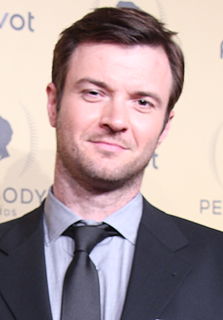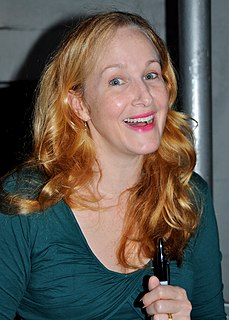A Quote by Errol Morris
But I can say what interests me about documentary is the fact that you don't know how the story ends at the onset - that you are investigating, with a camera, and the story emerges as you go along.
Related Quotes
The biggest threat to your creativity is the fear that it's already been done, said, created. (So why bother?)
Say it, do it, make it anyway - but tell YOUR story along the way.
The story of how you came to know what you know.
The story of what you want to know more of.
The story of why you do what you do.
The story of how you came to care.
And that's how you create what's never been created before.
I feel like, if I'm being honest with myself, my biggest skill set is as a writer 'cause I can do that quickly and I'm really grounded in story structure. Part of my success as an actor, is that I know story well. Part of my success as a director, is how well I know story. Same thing, as a producer. It all begins and ends with me as a story creator. But, I love doing it all.
You didn't plan to write a story; it just happened. Well, it could be argued that the next thing you should do is find a hole to dig. Right? So you start digging a hole and then somebody brings a body along and puts it in. That's what a story must feel like to me. It's not that you say, "I want to write a story about a gravedigger." But you're walking along and "I don't know what I'm doing here in this story,' and - boop! a shovel. "Oh, interesting. Ok, what does one do with a shovel? Digs a hole. Why? I don't know yet. Dig the hole! Oh, look a body."
Dustfinger inspected his reddened fingers and felt the taut skin. ‘He might tell me how my story ends,’ he murmured. Meggie looked at him in astonishment. ‘You mean you don’t know?’ Dustfinger smiled. Meggie still didn’t particularly like his smile. It seemed to appear only to hide something else. ‘What’s so unusual about that, princess?’ he asked quietly. ‘Do you know how your story ends?’ Meggie had no answer for that.
You have to be dynamic. You have to be able to change. So a lot of times we'll go to a country or go meet people, and then while we're there, the story changes and you have to be able to go with that. And then the story comes out in the editing room, which is a very documentary sort of process - not how news works. So that's different.
I prefer to surprise myself as I'm writing. I'm not interested in it if I already know where it's going. So I have only the most general sense of what I'm doing when I start a story. I sometimes have a destination in mind, but how the story is going to go from Point A to Point Z is something I make up as I go along.
Perhaps if there is anything remotely interesting about my writing style, it is this: more often than not I have no idea what the story is going to be about. Sometimes I have a fuzzy vision, or a glimpse of one scene, or a character. But mostly all I have is a random first sentence, and I follow it to see where it might go. For me, writing is the process of discovery, of gradually figuring out what happens in the story and how it ends, that makes writing an interesting process for me.
That's what I love about documentary filmmaking, we never know where the story is going, we don't know what is going to happen next, and we're inside a culture of people that you have to figure out in many ways. It's a relationship between what you thought might have been the story, and what happens in the 'field.'




































